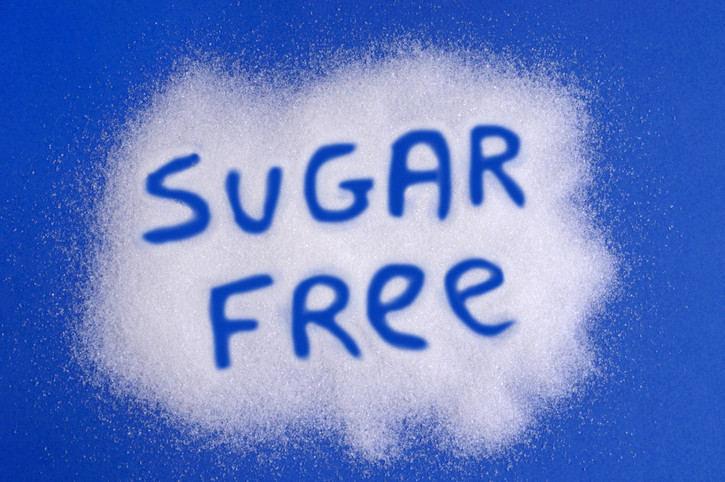
[ad_1]

If you are attempting to chop again on added sugar — and it’s best to, as a result of extra sugar will increase dangers for weight problems, diabetes, and coronary heart illness — you may be tempted by merchandise marketed as low sugar, no sugar, or sugar-free.
Many comprise acquainted low-calorie sugar substitutes like aspartame or sucralose as a substitute of sugar. And as you are studying labels, you additionally could run throughout one other ingredient: sugar alcohol, which is utilized in merchandise like sugar-free cookies, candies, ice cream, drinks, and chewing gums. Are any of those sweeteners a better option nutritionally? Dr. Frank Hu, professor of vitamin and epidemiology with the Harvard T.H. Chan School of Public Health, weighs in beneath.
Are low-calorie or no-calorie sweeteners any more healthy than pure sugar?
Also generally known as synthetic sweeteners or sugar substitutes, the record of low-calorie and no-calorie sweeteners you may even see on product vitamin labels consists of acesulfame-Okay, saccharin, sucralose, neotame, and advantame. These have the next sweetness depth per gram than pure sugar.
So far analysis on them is combined, though some observational research have discovered that drinks containing low-calorie sweeteners are related to a higher risk for diabetes and weight gain.
What precisely are sugar alcohols and how are you going to spot them?
Sugar alcohols could have probably the most deceptive identify, as they’re neither sugar nor alcohol, in accordance with Dr. Hu. “They are a type of carbohydrate derived from fruits and vegetables, although most commercial sugar alcohols are synthetically produced.”
You can normally spot many sugar alcohols on ingredient lists by “-ol” on the ends of their names. Examples embody sorbitol, xylitol, lactitol, mannitol, erythritol, and maltitol.
Are sugar alcohols any more healthy than different sugar substitutes or pure sugar?
Here is a have a look at the professionals and cons.
The upside of sugar alcohols
Sugar alcohols reside within the candy spot between pure sugar and low-calorie sweeteners. They usually are not as overly candy as sweeteners and do not add too many additional energy like sugar.
“Sugar alcohols are about 40% to 80% as sweet as natural sugar, whereas artificial sweeteners like aspartame are about 200 times sweeter,” says Dr. Hu. “And they have about 25% to 75% fewer calories per gram than sugar.”
Another upside of sugar alcohols is that they break down slowly within the intestine. Hence, your physique solely absorbs a part of their total carbohydrates. “This keeps your blood sugar and insulin levels from spiking as they do with sugar,” says Dr. Hu. “That makes them a useful sugar substitute for people with diabetes.”
The draw back of sugar alcohols
The foremost draw back to sugar alcohols is that this: when taken in excessive quantities they will trigger gastrointestinal (GI) issues, resembling belly ache, diarrhea, or unfastened stools.
Because sugar alcohols are slowly digested, they’ve extra time to feed micro organism within the intestine, which might result in fermentation and produce extra fuel. Their gradual digestion can also pull additional water into the colon and trigger a laxative impact.
People’s tolerance for sugar alcohols depends upon many components, together with physique weight, well being situations, and the quantity and kinds of sugar alcohols. “Individual differences in digestion and metabolism, gut microbiome composition, and dietary habits can also make a difference,” says Dr. Hu. “For these reasons, we recommend introducing sugar alcohols into your diet gradually and observing how your body responds.”
For individuals who expertise GI signs attributable to sugar alcohols, Dr. Hu says slicing again on the quantity of meals and drinks made with them typically can right the issue. “Sugar alcohols are commonly found in sugar-free or low-carb products, so pay attention to food labels” he says. “Because different sugar alcohols can have different effects, it might be useful to identify specific types of sugar alcohols that cause GI side effects.”
Do sugar alcohols have well being dangers?
Possible long-term well being dangers of sugar alcohol are nonetheless being explored. A 2023 observational study discovered a hyperlink between utilizing erythritol as an added sweetener and heart problems occasions, resembling stroke and coronary heart assault, in folks with coronary heart illness or who had danger components like diabetes and hypertension. However, these findings haven’t been confirmed in subsequent research.
“Sugar alcohols offer a healthier alternative to sugar because of their lower calorie content and reduced glycemic response, which is the effect food has on blood sugar levels,” says Dr. Hu. “But they also have potential drawbacks, especially for those with sensitive digestive systems, so it’s best to consume them in moderation as part of an overall healthy eating pattern.”
[adinserter block=”4″]
[ad_2]
Source link